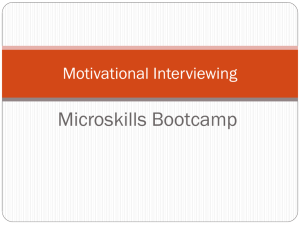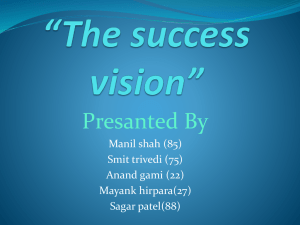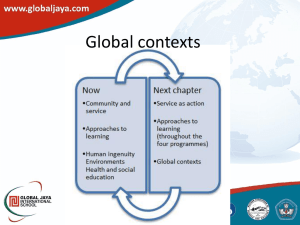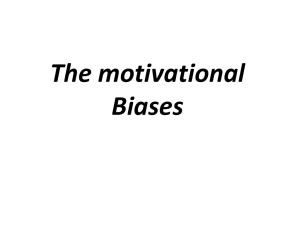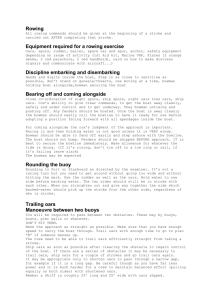Using Motivational Interviewing (MI) with Latino Populations
advertisement
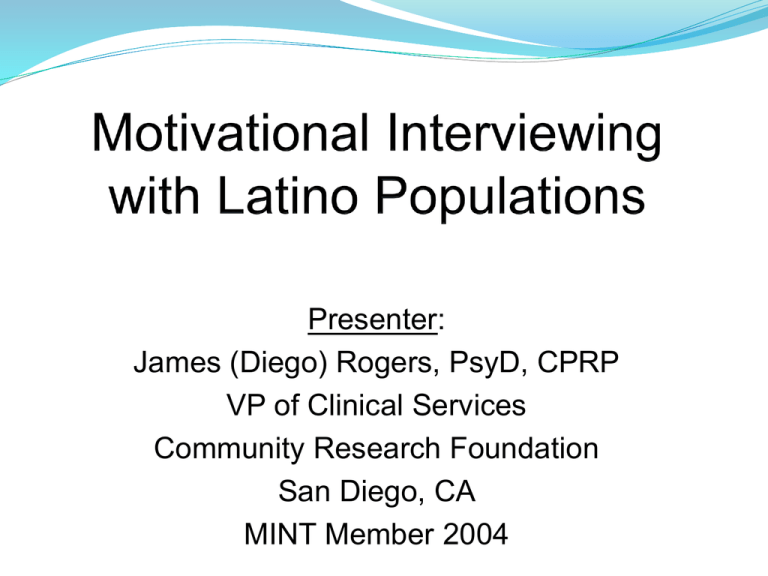
Presenter: James (Diego) Rogers, PsyD, CPRP VP of Clinical Services Community Research Foundation San Diego, CA MINT Member 2004 What is Motivational Interviewing? A person-centered directive method for enhancing internal motivation for change by exploring and resolving ambivalence. (Miller & Rollnick, 1991; 2002) What is Motivational Interviewing? A way of being with a person, not just a set of techniques for doing counseling. (Miller & Rollnick, 1991; 2002) Broader than Behavior Change Decision- to make a choice Forgiveness, leaving or staying Attitude- to become a different person To be more compassionate, assertive etc. Resolution- acceptance Complicated grief Finding peace regarding a decision Tolerance for anxiety, uncertainty etc. MI Spirit Autonomy (Person-centered) Collaboration Compassion Evocation (Guiding/eliciting style) Normal Human Reactions to the Righting Reflex (Teach/Direct) Invalidated Resist Withdraw Not respected Not understood Not heard Angry Ashamed Uncomfortable Unable to change Arguing Discounting Defensive Oppositional Denying Delaying Justifying Disengaged Disliking Inattentive Passive Avoid/leave Not return Normal Human Responses to a Listen/Evoke/Empathic Style Affirmed Accept Understood Open Accepted Undefensive Respected Interested Heard Cooperative Comfortable/safe Listening Empowered Hopeful/Able to change Approach Talk more Liking Engaged Activated Come back “Change Talk” The goal of MI is for the provider to guide the client to discuss/argue for his/her own reasons for change in a compassionate way that respects the client’s autonomy. 4 Principles of MI (2nd Edition) Express Empathy Develop Discrepancy Roll with Resistance Support Self-efficacy/Elicit Change Talk (Miller & Rollnick, 1991; 2002) Express Empathy (Use your OARS) Open-ended questions Affirmations Reflections Summaries Develop Discrepancy Empathize with the ambivalence Explore gains/losses of all options Imagine extreme outcomes Look forward & backward Amplify ambivalence with reflections & affirmations Values sorting What is Resistance? Therapy Interfering Behaviors Interpersonal (It takes two to resist) A signal of dissonance (empathic failure) Predictive of (non)change What is Sustain Talk? Desire for status quo Inability to change Reasons for sustaining status quo Need for status quo Commitment to status quo Sustain Talk and Resistance Sustain Talk is about the target behavior I really don’t want to stop smoking I have to have my pills to make it through the day Resistance is about your relationship You can’t make me quit You don’t understand how hard it is for me Both are highly responsive to counselor style How to Roll w/ Resistance (Sustain Talk) Simple/Double-sided Reflections Shifting Focus Agreement with a Twist Emphasizing Personal Choice Reframing Opposite sides of the same coin Preparatory Change Talk DESIRE to change (want, like, wish . . ) ABILITY to change (can, could . . ) REASONS to change (if . . then) NEED to change (need, have to, got to . .) Mobilizing Change Talk Reflects resolution of ambivalence COMMITMENT (intention, decision, promise) ACTIVATION (willing, ready, preparing) TAKING STEPS Responding to Change Talk (All EARS) Elaboration- Asking for elaboration, more detail, in what ways, an example, etc. Affirming- commenting positively on the person’s statement Reflecting- continuing the paragraph, etc. Summarizing- collecting bouquets of change talk Culturally Competent Adaptations Balancing act between maintaining fidelity to an evidence-based practice… While adapting and tailoring the practice to increase engagement, receptivity, efficacy, and value to the recipent(s) (Cultural Responsiveness). Linguistic Translations Incorporating Social Contexts Incorporating Cultural Values Linguistic Translations Motivational Interviewing (MI) = La Entrevista Motivacional (EM) MI Spirit = Espíritu de EM OARS = PARS Incorporating Social Contexts Immigration/migration experiences/status (including political/historical contexts) Contexts of Migration (Falicov, 1998) Receptivity of the host community/dominant culture Language barriers Experiences of Group Antagonism Acculturation process/Level of Acculturation Ethnic Identity Socio-economic Status Social Context A Cultural Adaptation of MI to Address Heavy Drinking Among Hispanics (Lee, Lopez, Colby, Caetano, Borrelli, & Rohsenow, 2011). Social Context of Immigration (OARS) Changing Family Dynamics (immigration & drinking) Social Support (familismo y amistades/compadres_ Alcohol Health Literacy (E-P-E) Incorporating Latino Cultural Variables Assess for value adherence (using OARS/PARS): Familismo (family orientation) Personalismo (relationships with people not agencies) Respeto (mutual respect and deference) Confianza (trust and intimacy in the relationship) Controlarse (self-containment or control) Agüantarse/Luchar (ability to withstand stress & difficult times) Poner de su parte (doing one’s part) Religión Latino Cultural Variables Engaging Latinos Through the Integration of Cultural Values and MI Principles (Añez, Silva, Paris Jr., Bedregal, 2008). Mental Health treatments were four times more effective when culturally modified for a specific group and when attentive to cultural context and values (Griner and Smith, 2006). General Research Findings on MI and Latinos Still generally limited in number of studies, sample sizes, and populations. Studies that do exist show that adopting the MI Spirit and incorporating social contexts and cultural values yielded favorable results in the therapeutic relationship: Personalismo Respeto Confianza (buena gente, simpatico) General Research Findings on MI and Latinos Studies also show that incorporating social contexts and cultural values with the MI principles/techniques yielded favorable results (High Engagement & Client Satisfaction): Clients enjoyed talking about their cultural values and striving for change toward those values (OARS). Clients enjoyed talking about the change plan goals and action plans (Agenda Setting and Change Talk). Clients enjoyed have an ability to demonstrate “poniendo de mi parte” (Change Talk) Clients enjoyed having their opinion “respected” even when given advice (E-P-E) Motivational Interviewing Web Site www.motivationalinterview.org
